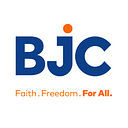Turning a commitment to faith freedom into action
By Bryan Kelley
Denver, Colorado
I really enjoyed my time as a BJC Fellow — unexpectedly, this one-year program ended up becoming a two-year program thanks to changes and delays tied to the COVID-19 pandemic (and I continue to be thankful BJC was very reasonable and proactive in adjusting plans in light of COVID!). I’ve been a big fan of BJC’s important work promoting religious liberty for all for a long time, so I am not surprised I ended up loving my time as a BJC Fellow and the few days I spent together with the other BJC Fellows in Colonial Williamsburg. It felt even more special as this was my first time traveling across the country in a very long time, and it ended up being time well spent with a great group of BJC staff and fellow Fellows.
Meeting in person gave us a great opportunity to get to know each other better, learn about the historic roots of religious liberty in the United States, dig deeper into contemporary debates and upcoming religious liberty cases being considered by the Supreme Court, and develop our advocacy skills in a way that would translate into continued positive action once we all go back home.
Religious liberty for all is incredibly important to me, and it was wonderful building relationships with BJC Fellows and staff who also clearly hold this commitment. I’m very happy that we had a range of voices present. I am not Baptist, and am not religious, but I still felt very welcome and respected in our conversations around religious liberty, which is a crucial right for those of any religion as well as for those who are not religious. BJC is clearly committed to the concept that a threat to religious liberty for anyone is a threat to religious liberty for everyone, and those values came through in the BJC Fellows Program. The ability to talk through religious liberty issues with other BJC Fellows — particularly with those who are members of or heads of houses of worship with members who may not agree with BJC’s commitments to religious liberty — really helped me appreciate BJC’s work even more.
BJC has an important voice and a unique positioning to be able to lead campaigns such as Christians Against Christian Nationalism, and I was happy to learn more about this program and how it has been used. I think our sessions going over the nuances of the First Amendment, and the “play in the joints” between the Establishment and Free Exercise Clauses really helped to solidify my appreciation of BJC’s understanding that religious liberty is not an absolute right that can simply allow the religious to trample on the civil rights of others in the name of religion. At a time when the phrase “religious liberty” has been weaponized by some to become a sword that works to deny the civil rights of others, BJC is such an important organization to stand up for religious liberty’s true value as a shield to ensure religious liberty for all.
The BJC Fellows Program really helped me think about how I can take my commitment to religious liberty and act on it to advocate in more concrete terms than simply promoting awareness of or speaking out about religious liberty issues. As part of our seminar, we had a session on legislative advocacy, including mock interviews with “legislative staffers” to make specific asks regarding religious liberty to representatives in their offices. I’m looking forward to putting those skills into action and becoming more of a voice to promote religious liberty in specific, actionable ways in my personal life. BJC Fellows will also be developing personal projects in the months following our time in Colonial Williamsburg, and I appreciate this opportunity to find ways to continue to put words into action in promotion of religious liberty for all.
A member of the 2021 BJC Fellows class, Bryan Kelley is a policy researcher in Denver, Colorado.
